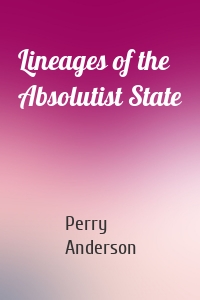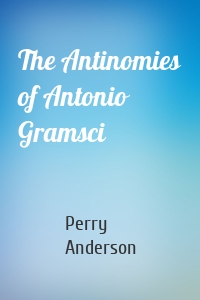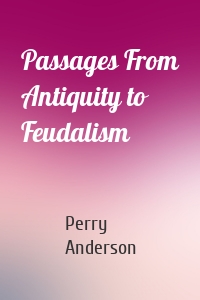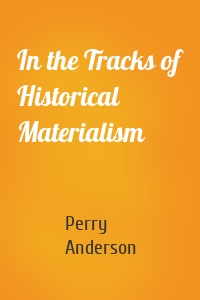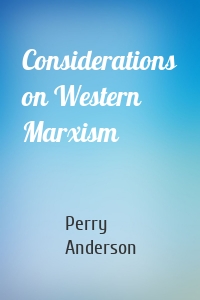Perry Anderson
13 кн.
Lineages of the Absolutist State
Situating the Absolutist states of the early modern epoch against the background of European feudalism. Forty years after its original publication, Lineages of the Absolutist State remains an exemplary achievement in comparative history. Picking up from where its companion volume, Passages from Antiquity to Feudalism, left off, Lineages traces the development of Absolutist states in the early modern period from their roots in European feudalism, and assesses their various trajectories. Why...
| Автор | Perry Anderson |
The Antinomies of Antonio Gramsci
A major essay on the thought of the great Italian Marxist An explosive analysis of the central strategic concepts in the thought of the great Italian Marxist, Anderson’s essay has been the subject of book-length attacks across four decades for its disentangling of the hesitations and contradictions in Gramsci’s highly original usage of such key dichotomies as East and West, domination and direction, hegemony and dictatorship, state and civil society, war of position and war of movement. In a...
| Автор | Perry Anderson |
Passages From Antiquity to Feudalis...
How the slave-based societies of Ancient Greece and Rome became the feudal societies of the Middle Ages. Passages from Antiquity to Feudalism is a sustained exercise in historical sociology that shows how the slave-based societies of Ancient Greece and Rome eventually became the feudal societies of the Middle Ages. In the course of this study, Anderson vindicates and refines the explanatory power of historical materialism, while casting a fascinating light on the Ancient world, the Germanic...
| Автор | Perry Anderson |
In the Tracks of Historical Materia...
How Marxist thought evolved in the seventies and early eighties. What have been the major changes in the intellectual landscape of the left since the mid seventies? Have they on balance represented an emancipation or a retreat for socialist culture as a whole? In the Tracks of Historical Materialism looks at some of the paradoxes in the evolution of Marxist thought in this period. It starts by considering the remarkable and variegated growth of historical materialism in the Anglo-American...
| Автор | Perry Anderson |
Arguments Within English Marxism
The characteristic form taken by English Marxism since the war has been the study of history. No writer exemplifies its achievements better than Edward Thompson, whose Making of the English Working Class is probably the most influential single work of historical scholarship by a socialist today. An editor of The New Reasoner in 1957–59, a founder of the New Left in 1960, now an eloquent champion of civil rights, Thompson has most recently aroused widespread interest with the appearance of his...
| Автор | Perry Anderson |
American Foreign Policy and Its Thi...
Magisterial account of the ideas and the figures who have forged the American Empire Since the birth of the nation, impulses of empire have been close to the heart of the United States. How these urges interact with the way the country understands itself, and the nature of the divergent interests at work in the unfolding of American foreign policy, is a subject much debated and still obscure. In a fresh look at the topic, Anderson charts the intertwined historical development of America’s...
| Автор | Perry Anderson |
Considerations on Western Marxism
This synoptic essay considers the nature and evolution of the Marxist theory that developed in Western Europe, after the defeat of the proletarian rebellions in the West and the isolation of the Russian Revolution in the East in the early 1920s. It focuses particularly on the work of Lukács, Korsch and Gramsci; Adorno, Marcuse and Benjamin; Sartre and Althusser; and Della Volpe and Colletti, together with other figures within Western Marxism from 1920 to 1975. The theoretical production of each...
| Автор | Perry Anderson |
The H-Word
A fascinating history of the political theory of hegemony Few terms are so widely used in the literature of international relations and political science, with so little agreement about their exact meaning, as hegemony. In the first full historical study of its fortunes as a concept, Perry Anderson traces its emergence in Ancient Greece, its rediscovery during the upheavals of 1848–9 in Germany, and then its chequered career in revolutionary Russia, fascist Italy, Cold War America, Thatcherized...
| Автор | Perry Anderson |
Das Mosaik des Islam
Wird die Gegenwart kompliziert, hilft es, einen Blick zurück zu werfen. Im Gespräch mit seinem Kollegen Perry Anderson zeichnet der Historiker Suleiman Mourad die Geschichte des Korans und des muslimischen Glaubens nach. Dass hier ein sachkundiger Mediävist und Kenner der politischen und intellektuellen Landschaft der Gegenwart Rede und Antwort steht, ist das große Glück dieses über die Dauer eines Jahres geführten Dialogs. Der Bogen spannt sich von den Anfängen des Korans über Mohammed,...
| Автор | Perry Anderson |




